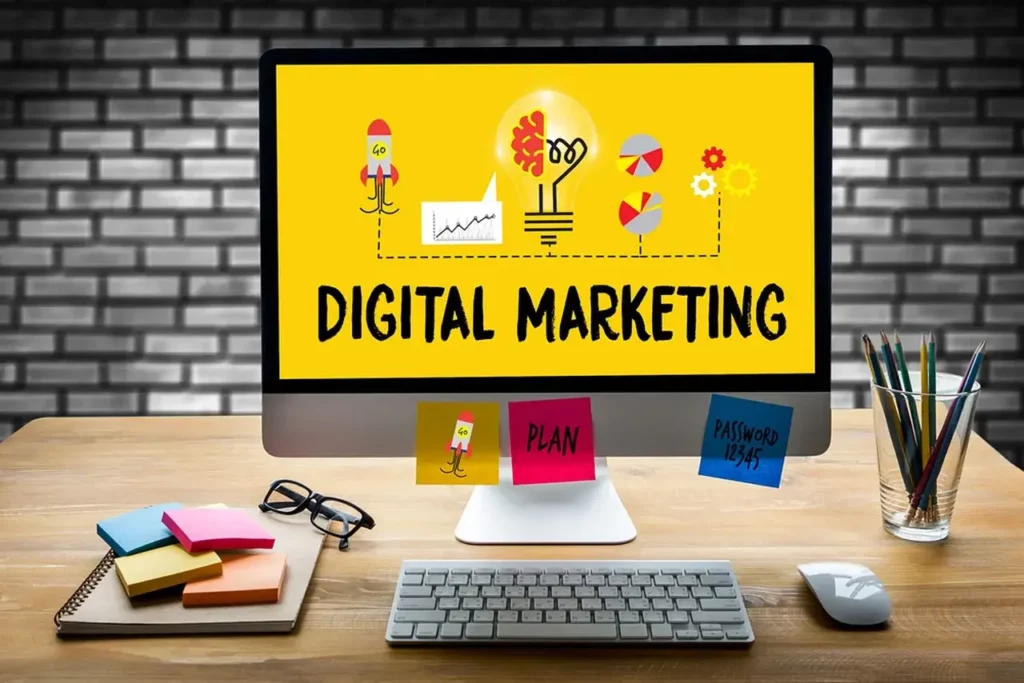Promptly (In the rapidly) evolving landscape of digital marketing, the integration of artificial intelligence (AI) has emerged as a game-changer. Machine learning technologies (AI technologies) are revolutionizing the way businesses interact with their customers, analyze data, and execute marketing strategies. This article explores the pivotal role of AI in modern digital marketing and its impact on businesses worldwide
AI-Powered Personalization
One of the key aspects where AI excels in digital marketing is personalization. By leveraging AI algorithms, businesses can create tailored user experiences based on individual preferences and behaviors. Through predictive analytics, AI can anticipate customer needs and deliver personalized recommendations, thereby enhancing customer satisfaction and loyalty.
Enhanced Targeting and Segmentation
AI promotes (enables) marketers to target their audiences with unparalleled precision. By analyzing vast amounts of data, Intelligent algorithm (AI algorithms) can identify valuable segments within the target market and tailor marketing campaigns accordingly. This level of granularity allows businesses to maximize the effectiveness of their marketing efforts and achieve higher conversion rates.
Content Creation and Optimization
AI-powered tools are revolutionizing content creation and optimization processes. From generating blog posts to crafting compelling ad copy, AI algorithms can produce high-quality content at scale. Additionally, AI-driven SEO tools help businesses optimize their content for search engines, improving visibility and driving organic traffic to their websites.
Data Analysis and Insights
In the era of big data, AI plays a crucial role in extracting actionable insights from vast datasets. Real-time data analytics powered by AI algorithms enable marketers to make informed decisions and adapt their strategies on the fly. Moreover, predictive analytics tools help businesses forecast trends and anticipate market shifts, giving them a competitive edge in the digital landscape.
Chatbots and Customer Service
AI-powered chatbots have become ubiquitous in modern customer service operations. These virtual assistants provide round-the-clock support, answer customer queries, and facilitate seamless interactions. By leveraging natural language processing (NLP) capabilities, AI chatbots offer personalized assistance, enhancing the overall customer experience.
Campaign Management and Optimization
AI streamlines the process of campaign management and optimization, allowing marketers to automate repetitive tasks and focus on strategic initiatives. From ad targeting to budget allocation, AI algorithms optimize marketing campaigns in real-time, maximizing ROI and efficiency.
Social Media Management
Social media management has been transformed by AI technologies. AI-driven tools automate routine tasks such as scheduling posts, analyzing engagement metrics, and responding to comments. Sentiment analysis algorithms help businesses gauge audience sentiment and tailor their content accordingly, fostering deeper connections with their followers.
Competitive Advantage
Businesses that embrace AI gain a significant competitive advantage in the digital marketplace. By harnessing the power of AI-driven insights and automation, companies can outmaneuver competitors and stay ahead of industry trends. Moreover, AI enables businesses to deliver personalized experiences that resonate with their target audience, fostering brand loyalty and advocacy.
Challenges and Limitations
Despite its myriad benefits, AI adoption in digital marketing comes with its own set of challenges and limitations. Concerns about data privacy and security are paramount, as AI algorithms rely on vast amounts of sensitive information. Moreover, there is a risk of over-reliance on AI, which may lead to a loss of human touch in marketing interactions.
Future Trends in AI and Modern Digital Marketing

Looking ahead, the future of AI in modern digital marketing looks promising. Advancements in AI technologies, such as machine learning and natural language processing, will further enhance the capabilities of marketing automation tools. Additionally, the rise of voice search and augmented reality presents new opportunities for AI-powered marketing strategies.
Case Studies
Numerous businesses have already reaped the rewards of AI integration in their marketing efforts. Companies like Amazon and Netflix leverage AI algorithms to deliver personalized recommendations to their customers, driving engagement and sales. Similarly, brands like Spotify use AI-driven insights to curate customized playlists for their users, enhancing user satisfaction and retention.
Unleashing the Power (Unlocking the Potential) of AI in Modern Digital Marketing
As businesses navigate the ever-evolving landscape of modern digital marketing, the integration of artificial intelligence (AI) has emerged as a pivotal strategy for success. AI technologies offer a myriad of opportunities to streamline processes, enhance customer experiences, and drive business growth. In this article, we delve deeper into the transformative role of AI in modern digital marketing and how businesses can leverage its power to gain a competitive edge.
Harnessing AI for Customer Insights
One of the primary benefits of AI in modern digital marketing lies in its ability to unlock valuable insights from vast datasets. Through advanced data analytics and machine learning algorithms, AI can extract actionable intelligence about customer behaviors, preferences, and trends. By understanding their audience on a deeper level, businesses can tailor their marketing strategies to resonate with their target demographics effectively.
Personalization at Scale
AI-guided customization (AI-powered personalization) is revolutionizing the way businesses interact with their customers. By analyzing user data in real-time, AI algorithms can deliver highly personalized experiences across multiple touchpoints, from website interactions to email marketing campaigns. Whether it’s recommending relevant products or customizing content based on browsing history, AI enables businesses to forge meaningful connections with their audience on an individual level.
Optimizing Content Creation and Delivery
Content is king in the digital realm, and AI is empowering marketers to create and deliver high-quality content more efficiently than ever before. From automated content generation to dynamic content optimization, AI-driven tools are revolutionizing the content creation process. By harnessing natural language processing (NLP) and machine learning capabilities, businesses can produce compelling content that resonates with their audience while optimizing it for search engines to improve visibility and drive organic traffic.
Maximizing ROI with Predictive Analytics
Predictive analytics powered by AI is a game-changer for marketers seeking to maximize their return on investment (ROI). By analyzing historical data and identifying patterns, AI algorithms can forecast future trends and outcomes with remarkable accuracy. This foresight enables businesses to allocate resources more effectively, optimize their marketing spend, and anticipate market shifts before they occur, giving them a competitive advantage in a rapidly changing landscape.
Empowering Customer Engagement through Chatbots
AI-driven chatbots are revolutionizing customer service and support, providing instant assistance to users 24/7. These virtual assistants leverage natural language processing and machine learning to understand user queries and provide relevant responses in real-time. By offering personalized assistance and resolving customer issues promptly, chatbots enhance the overall customer experience while freeing up human agents to focus on more complex tasks.
Navigating Ethical Considerations
While the benefits of AI in modern digital marketing are undeniable, businesses must also navigate ethical considerations associated with its use. Concerns about data privacy, algorithmic bias, and the ethical implications of automated decision-making are paramount. It’s essential for businesses to prioritize transparency, accountability, and ethical AI practices to build trust with their customers and mitigate potential risks.
Looking Ahead: The Future of AI in Modern Digital Marketing
As AI technologies continue to evolve, the future of digital marketing looks increasingly intelligent and dynamic. Advancements in areas such as natural language processing, computer vision, and predictive analytics will further enhance the capabilities of AI-driven marketing tools. Additionally, emerging technologies such as augmented reality (AR) and virtual assistants present new opportunities for innovative marketing strategies that blur the lines between physical and digital experiences
Conclusion
In conclusion, AI has become an indispensable tool in modern digital marketing. From personalized customer experiences to data-driven insights, AI empowers businesses to optimize their marketing strategies and achieve tangible results. As technology continues to evolve, the role of AI in digital marketing will only become more prominent, reshaping the industry landscape and driving innovation.
FAQs
1.Are the primary benefits of AI in digital marketing?
- AI in digital marketing offers benefits such as personalized user experiences, enhanced targeting and segmentation, streamlined campaign management, and data-driven insights.
2. How does AI help in improving customer engagement?
- AI enables businesses to deliver personalized content and recommendations to their customers, fostering deeper engagement and loyalty.
3.What are some popular AI tools used in digital marketing?
- Popular AI tools in digital marketing include chatbots, predictive analytics platforms, content generation tools, and social media management software.
4.Are there any ethical Ethical issue (concerns) associated with AI in marketing?
- Yes, ethical concerns such as data privacy, algorithmic bias, and the loss of human touch in marketing interactions are associated with AI adoption in marketing.
5.How can businesses overcome challenges in AI adoption for marketing purposes?
- Businesses can overcome challenges in AI adoption by prioritizing data privacy and security, maintaining a balance between AI automation and human touch, and investing in employee training and development.






[…] Social media platforms offer a powerful channel for businesses to connect with their audience, build brand awareness, and drive engagement. However, Efficient (effective) social media marketing requires careful planning and execution. […]